ESPEN指南-外科临床营养
2021ESPEN肿瘤临床营养指南节选

一项针对151例接受同步放化疗的非小细胞肺癌患者的回顾性研究,观察了早期体 重丢失(治疗开始至治疗第三周)对中位生存期(40个月)的影响,结果发现体 重丢失大于5%的患者较体重丢失小于5%者中位生存期显著缩短(13个月 95% CI:2.0-24 vs 23个月 95% CI:14.7-31.3)。
70.00%
60.00%
50.00%
40.00%
30.00%
20.00%
10.00%
0.00%
胰腺
食道和/或胃 头颈部
肺
卵巢/子宫 结肠/直肠 白血病/淋巴瘤 乳腺
前列腺
1. Hébuterne X, Lemarié E, Michallet M, de Montreuil CB, Schneider SM, Goldwasser F. Prevalence of malnutrition and current use of nutrition support in patients with cancer. JPEN J Parenter Enteral Nutr 2014;38:196-204
Support Care Cancer. 2005 Apr;13(4):270-4.
2022ESPEN肿瘤临床营养指南框架
营养筛查评估与能量营养推荐
营养风险筛查与评估
• 最新的医保政策要求,所有使用肠外、肠内营养制剂的患者需要医保 都需要进行营养风险筛查。
营养风险筛查与评估工具
营养筛查的工具
与内科肿瘤患者相关的干预措施
与癌症幸存者相关的干预措施和姑息治疗
晚期患者的营养支持建议
ESPEN指南(2017)
C6-1
晚期肿瘤:筛查与评定
2020年《ESPEN指南:急性和慢性胰腺炎临床营养》(急性胰腺炎部分)

2020年《ESPEN指南:急性和慢性胰腺炎临床营养》(急性胰腺炎部分)前⾔急性和慢性胰腺炎均是常见的胰腺疾病,与营养不良的风险显著相关,可能需要营养⽀持。
然⽽,虽然⽬前已有胰腺疾病相关指南发表(2018ESGE多学循证指南:慢性胰腺炎的诊断和治疗),但在胰腺炎的营养⽀持⽅⾯仍缺乏专门的共识。
科循证指南:急性坏死性胰腺炎的内镜管理科循证指南:急性坏死性胰腺炎的内镜管理、2017UEG循证指南:慢性胰腺炎的诊断和治疗2020年1⽉,欧洲临床营养和代谢学会(ESPEN)发布了急慢性胰腺炎的临床营养指南,填补了该领域营养治疗的空⽩[1]。
该指南内容较多,本次优先介绍急性胰腺炎的临床营养管理部分。
该指南使⽤苏格兰学院间指南⽹络(Scottish Intercollegiate Guidelines Network,SIGN)对⽂献进⾏分级,根据证据等级对推荐意见评为A、B、0、CPP四个等级急性胰腺炎的临床营养管理背景急性胰腺炎(Acute pancreatitis,AP)多数病例(约80%)预后良好。
然⽽,⾼达20%的患者易发⽣急性坏死性胰腺炎,在这种环境下,患者分解代谢⾮常⾼,因此营养⽀持是疾病管理的重要基⽯之⼀,下图为AP患者营养管理的⼀般流程。
急性胰腺炎营养管理流程图AP患者的营养风险筛查推荐意见1:预测为轻度或中度AP的所有患者,均应使⽤有效的筛查⽅法进⾏筛查,例如营养风险筛查⼯具(NRS-2002);预测为重度AP的患者均应考虑其存在营养风险。
——推荐等级B-强共识(100%)指南认为,由于AP具有⾼分解代谢特性以及营养状况对疾病发展的影响,AP患者应该被认为存在中度⾄⾼度营养风险,因此采⽤NRS-2002等风险筛查⼯具有助于识别患者的营养风险。
AP患者的营养治疗选择推荐意见2:针对轻度急性胰腺炎患者,⽆论⾎清脂肪酶⽔平如何,⼀旦临床耐受,应尽早给予经⼝喂养。
——推荐等级A-强共识(100%)四项RCT试验表明,轻度或中度AP患者可以耐受经⼝喂养。
2021欧洲临床营养与代谢协会ESPEN外科营养治疗实践指南(全文)
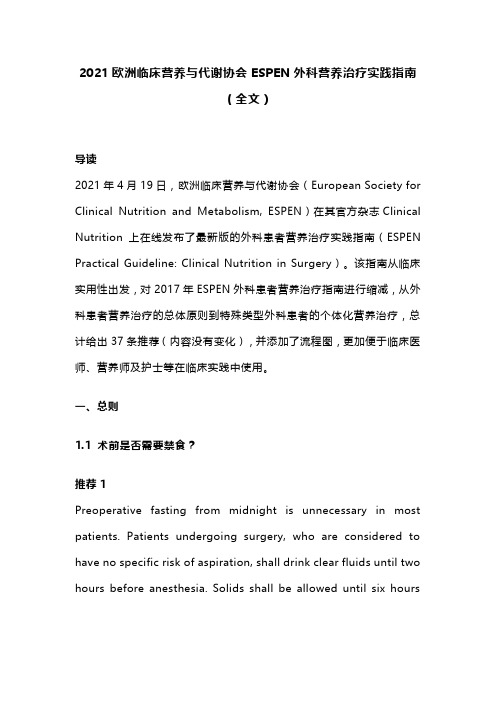
2021欧洲临床营养与代谢协会ESPEN外科营养治疗实践指南(全文)导读2021年4月19日,欧洲临床营养与代谢协会(European Society for Clinical Nutrition and Metabolism, ESPEN)在其官方杂志Clinical Nutrition上在线发布了最新版的外科患者营养治疗实践指南(ESPEN Practical Guideline: Clinical Nutrition in Surgery)。
该指南从临床实用性出发,对2017年ESPEN外科患者营养治疗指南进行缩减,从外科患者营养治疗的总体原则到特殊类型外科患者的个体化营养治疗,总计给出37条推荐(内容没有变化),并添加了流程图,更加便于临床医师、营养师及护士等在临床实践中使用。
一、总则1.1 术前是否需要禁食?推荐1Preoperative fasting from midnight is unnecessary in most patients. Patients undergoing surgery, who are considered to have no specific risk of aspiration, shall drink clear fluids until two hours before anesthesia. Solids shall be allowed until six hoursbefore anesthesia. (Grade of recommendation A –strong consensus)大部分患者不需要从术前当晚开始禁食。
无误吸风险的患者可在麻醉前2小时饮用清流质,麻醉前6小时进食固体食物。
(推荐等级A-强烈同意)1.2 择期手术患者使用碳水化合物进行术前代谢准备能否获益?推荐2In order to reduce perioperative discomfort including anxiety oral preoperative carbohydrate treatment (instead of overnight fasting, the night before and two hours before surgery) should be administered (B). To impact postoperative insulin resistance and LOS, preoperative carbohydrates can be considered in patients undergoing major surgery (0). (Grade of recommendation B/0 –strong consensus)手术前夜以及术前2小时口服碳水化合物(不需要术前禁食禁饮)有助于减少焦虑等不适(B)。
《ESPEN重症病人营养指南(2023版)》解读PPT课件

02
多学科合作
营养支持团队应包括医生、营养师、护士等多学科专业人员,共同协作,为患者提供全面的营养支持。
营养与免疫:进一步研究重症患者的营养与免疫关系,探讨营养支持对免疫功能的影响及机制。
04
ESPEN指南与其他国家/地区指南的比较分析
ESPEN指南在营养支持策略、营养评估方法、肠内营养与肠外营养的选择等方面,与其他国家/地区的指南存在明显差异。例如,ESPEN指南更强调早期肠内营养的重要性,而其他指南可能更注重肠外营养的补充。
特殊营养需求
指南还关注了重症患者的特殊营养需求,如免疫功能调节、抗氧化应激和胃肠道功能维护等。这为临床医生提供了更全面的营养管理思路。
03
患者参与
鼓励患者及其家属参与营养支持计划的制定和实施,提高患者的依从性和满意度。
01
个体化营养支持
根据患者的具体病情和营养状况,制定个体化的营养支持计划,以满足患者的实际需求。
异点
各指南均强调重症病人的营养支持对改善预后、降低并发症风险的重要性,以及个体化营养支持策略的制定和实施。
同点
05
ESPEN重症病人营养指南在临床实践中的意义和价值
提高生存率
促进康复
改善生活质量
通过合理的营养支持,可以改善重症患者的营养状况,增强其免疫功能,从而降低感染等并发症的风险,提高生存率。
营养支持有助于加速重症患者的组织修复和伤口愈合,缩短住院时间,减少医疗支出。
合理的营养支持可以改善重症患者的营养状况,提高其生活质量,减轻家庭和社会的负担。
提供规范化指导
ESPEN重症病人营养指南为临床医生提供了规范化的营养支持方案和建议,有助于医生制定科ESPEN指南促进了医生、营养师、护士等多学科团队之间的合作与沟通,提高了治疗效果。
2023年欧洲肠外营养指南

欧洲肠外肠内养分学会〔ESPEN〕于2023 年公布了肝病患者肠外养分指南,目的是供给基于证据的肝病肠外养分建议。
指南选择了酒精性脂肪性肝炎〔ASH〕、肝纤维化〔LC〕和急性肝衰竭〔ALF〕作为代表性肝病进展详述。
指南由跨学科专家组依据公认的标准和1985 年以来的相关争论而起草,公布于ESPEN 网站。
有关建议的证据分级承受ABC 三级:A 级为多个随机临床试验或荟萃分析,B 级为一个随机比照或非随机临床试验,C 级为专家共识、病例观看或医疗标准。
现将指南要点介绍如下。
Clin Nutr. 2023 Aug;28(4):436-44. Epub 2023 Jun 11.ESPEN Guidelines on Parenteral Nutrition: hepatology.Plauth M, Cabre E, Campillo B, Kondrup J, Marchesini G, Schutz T, Shenkin A, Wendon J; ESPEN.指南首先给出了总体意见:肠外养分可改善养分不良的ASH 患者养分状况和肝功能;肠外养分对于患有肝纤维化和严峻肝性脑病的病人是安全的,并可改善其精神状态;围手术期〔含肝移植〕肠外养分是安全的,并可削减并发症;对于肠内养分缺乏或禁忌的急性肝衰竭患者,肠外养分也是安全的二线选择。
一、酒精性脂肪性肝炎1、ASH患者应用肠外养分的指征和时机推举:对于中度或者重度养分不良ASH患者,经口或肠内养分方法不能满足需求,应马上开头肠外养分支持〔A〕;假设ASH 患者能够经口或经肠道猎取足够养分,但必需禁食12h 以上的〔包括夜间禁食〕,应当赐予葡萄糖每日2~3g/kg 静注;假设禁食超过72h,须赐予全胃肠外养分支持〔C〕。
已有文献指出ASHⅢ度患者推断养分不良状态的预后价值。
推举使用简洁的床旁方法如“客观整体评估法〔SGA〕”或者人体测量学以鉴别出存在风险的患者。
2023年《ESPEN指南:共病住院患者营养支持》解读
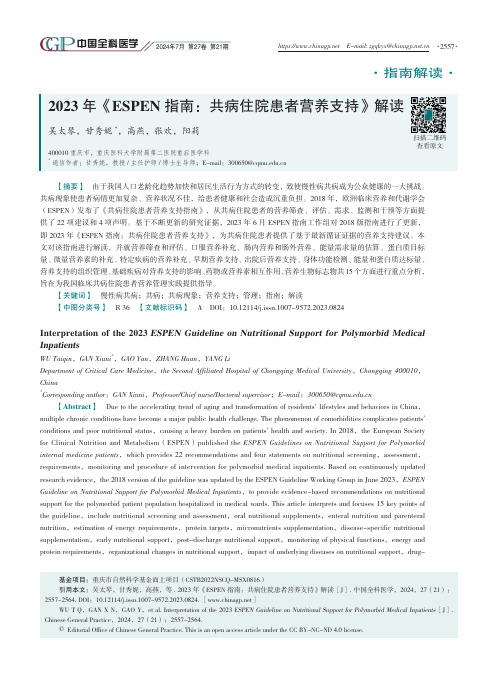
·指南解读·【摘要】 由于我国人口老龄化趋势加快和居民生活行为方式的转变,致使慢性病共病成为公众健康的一大挑战。
共病现象使患者病情更加复杂、营养状况不佳,给患者健康和社会造成沉重负担。
2018年,欧洲临床营养和代谢学会(ESPEN)发布了《共病住院患者营养支持指南》,从共病住院患者的营养筛查、评估、需求、监测和干预等方面提供了22项建议和4项声明。
基于不断更新的研究证据,2023年6月ESPEN 指南工作组对2018版指南进行了更新,即2023年《ESPEN 指南:共病住院患者营养支持》,为共病住院患者提供了基于最新循证证据的营养支持建议。
本文对该指南进行解读,并就营养筛查和评估、口服营养补充、肠内营养和肠外营养、能量需求量的估算、蛋白质目标量、微量营养素的补充、特定疾病的营养补充、早期营养支持、出院后营养支持、身体功能检测、能量和蛋白质达标量、营养支持的组织管理、基础疾病对营养支持的影响、药物或营养素相互作用、营养生物标志物共15个方面进行重点分析,旨在为我国临床共病住院患者营养管理实践提供指导。
【关键词】 慢性病共病;共病;共病现象;营养支持;管理;指南;解读【中图分类号】 R 36 【文献标识码】 A DOI:10.12114/j.issn.1007-9572.2023.0824Interpretation of the 2023 ESPEN Guideline on Nutritional Support for Polymorbid Medical InpatientsWU Taiqin ,GAN Xiuni *,GAO Yan ,ZHANG Huan ,YANG LiDepartment of Critical Care Medicine ,the Second Affiliated Hospital of Chongqing Medical University ,Chongqing 400010,China*Corresponding author :GAN Xiuni ,Professor/Chief nurse/Doctoral supervisor ;E-mail :***************.cn【Abstract 】 Due to the accelerating trend of aging and transformation of residents ' lifestyles and behaviors in China,multiple chronic conditions have become a major public health challenge. The phenomenon of comorbidities complicates patients ' conditions and poor nutritional status,causing a heavy burden on patients ' health and society. In 2018,the European Society for Clinical Nutrition and Metabolism(ESPEN)published the ESPEN Guidelines on Nutritional Support for Polymorbid internal medicine patients ,which provides 22 recommendations and four statements on nutritional screening,assessment,requirements,monitoring and procedure of intervention for polymorbid medical inpatients. Based on continuously updated research evidence,the 2018 version of the guideline was updated by the ESPEN Guideline Working Group in June 2023,ESPEN Guideline on Nutritional Support for Polymorbid Medical Inpatients ,to provide evidence-based recommendations on nutritional support for the polymorbid patient population hospitalized in medical wards. This article interprets and focuses 15 key points of the guideline,include nutritional screening and assessment,oral nutritional supplements,enteral nutrition and parenteral nutrition,estimation of energy requirements,protein targets,micronutrients supplementation,disease-specific nutritional supplementation,early nutritional support,post-discharge nutritional support,monitoring of physical functions,energy and protein requirements,organizational changes in nutritional support,impact of underlying diseases on nutritional support,drug-基金项目:重庆市自然科学基金面上项目(CSTB2022NSCQ-MSX0816)引用本文:吴太琴,甘秀妮,高燕,等. 2023年《ESPEN 指南:共病住院患者营养支持》解读[J]. 中国全科医学,2024,27(21):2557-2564. DOI:10.12114/j.issn.1007-9572.2023.0824. []WU T Q,GAN X N,GAO Y,et al. Interpretation of the 2023 ESPEN Guideline on Nutritional Support for Polymorbid Medical Inpatients [J]. Chinese General Practice,2024,27(21):2557-2564.© Editorial Office of Chinese General Practice. This is an open access article under the CC BY-NC-ND 4.0 license.扫描二维码查看原文慢性病共病通常是指个体同时患有两种或两种以上的慢性疾病,简称“共病”[1]。
ESPEN指南外科临床营养
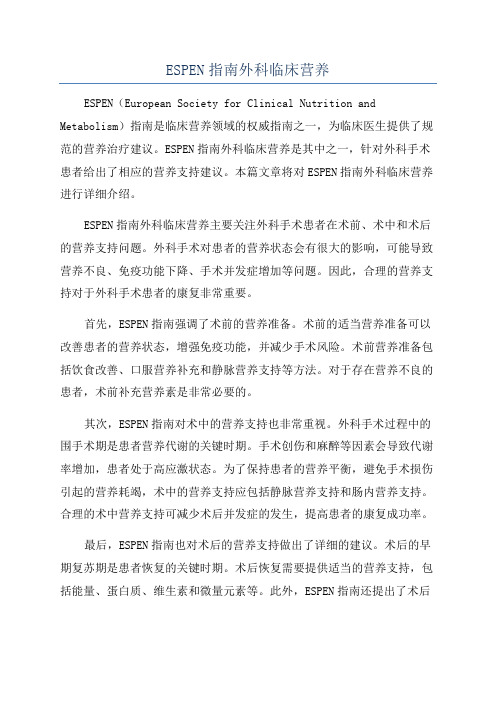
ESPEN指南外科临床营养ESPEN(European Society for Clinical Nutrition and Metabolism)指南是临床营养领域的权威指南之一,为临床医生提供了规范的营养治疗建议。
ESPEN指南外科临床营养是其中之一,针对外科手术患者给出了相应的营养支持建议。
本篇文章将对ESPEN指南外科临床营养进行详细介绍。
ESPEN指南外科临床营养主要关注外科手术患者在术前、术中和术后的营养支持问题。
外科手术对患者的营养状态会有很大的影响,可能导致营养不良、免疫功能下降、手术并发症增加等问题。
因此,合理的营养支持对于外科手术患者的康复非常重要。
首先,ESPEN指南强调了术前的营养准备。
术前的适当营养准备可以改善患者的营养状态,增强免疫功能,并减少手术风险。
术前营养准备包括饮食改善、口服营养补充和静脉营养支持等方法。
对于存在营养不良的患者,术前补充营养素是非常必要的。
其次,ESPEN指南对术中的营养支持也非常重视。
外科手术过程中的围手术期是患者营养代谢的关键时期。
手术创伤和麻醉等因素会导致代谢率增加,患者处于高应激状态。
为了保持患者的营养平衡,避免手术损伤引起的营养耗竭,术中的营养支持应包括静脉营养支持和肠内营养支持。
合理的术中营养支持可减少术后并发症的发生,提高患者的康复成功率。
最后,ESPEN指南也对术后的营养支持做出了详细的建议。
术后的早期复苏期是患者恢复的关键时期。
术后恢复需要提供适当的营养支持,包括能量、蛋白质、维生素和微量元素等。
此外,ESPEN指南还提出了术后早期的肠内营养支持原则,鼓励尽早恢复肠道功能,提倡早期进食。
若患者不能满足肠道营养需求,可考虑采用肠内外联合营养支持方法。
综上所述,ESPEN指南外科临床营养为临床医生提供了外科手术患者的营养支持建议。
术前的营养准备、术中的营养支持和术后的营养恢复都被强调,以保证患者的营养状态和免疫功能。
合理的营养支持可以减少手术风险,提高患者的康复成功率。
欧洲外科营养指南
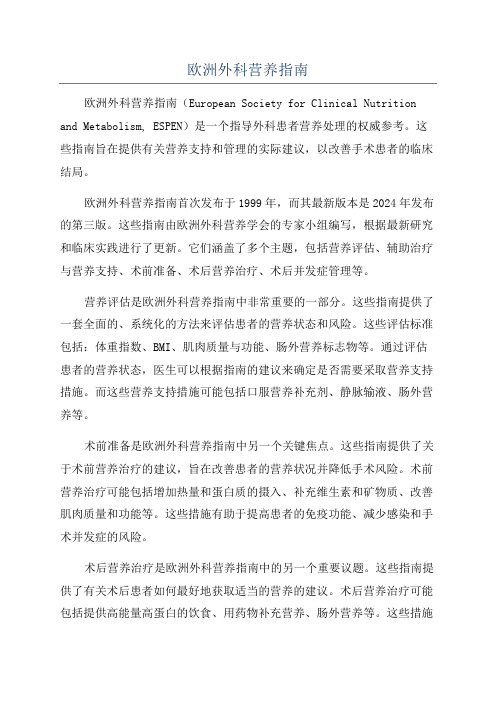
欧洲外科营养指南欧洲外科营养指南(European Society for Clinical Nutrition and Metabolism, ESPEN)是一个指导外科患者营养处理的权威参考。
这些指南旨在提供有关营养支持和管理的实际建议,以改善手术患者的临床结局。
欧洲外科营养指南首次发布于1999年,而其最新版本是2024年发布的第三版。
这些指南由欧洲外科营养学会的专家小组编写,根据最新研究和临床实践进行了更新。
它们涵盖了多个主题,包括营养评估、辅助治疗与营养支持、术前准备、术后营养治疗、术后并发症管理等。
营养评估是欧洲外科营养指南中非常重要的一部分。
这些指南提供了一套全面的、系统化的方法来评估患者的营养状态和风险。
这些评估标准包括:体重指数、BMI、肌肉质量与功能、肠外营养标志物等。
通过评估患者的营养状态,医生可以根据指南的建议来确定是否需要采取营养支持措施。
而这些营养支持措施可能包括口服营养补充剂、静脉输液、肠外营养等。
术前准备是欧洲外科营养指南中另一个关键焦点。
这些指南提供了关于术前营养治疗的建议,旨在改善患者的营养状况并降低手术风险。
术前营养治疗可能包括增加热量和蛋白质的摄入、补充维生素和矿物质、改善肌肉质量和功能等。
这些措施有助于提高患者的免疫功能、减少感染和手术并发症的风险。
术后营养治疗是欧洲外科营养指南中的另一个重要议题。
这些指南提供了有关术后患者如何最好地获取适当的营养的建议。
术后营养治疗可能包括提供高能量高蛋白的饮食、用药物补充营养、肠外营养等。
这些措施有助于改善围手术期患者的蛋白质平衡、促进创面愈合、降低感染和并发症的风险。
另外,欧洲外科营养指南还提供了术后并发症管理的建议。
根据指南,术后并发症可能包括营养不良、营养不平衡、创面感染、器官功能障碍等。
因此,指南提供了一些管理这些并发症的策略,以提高患者的临床结局。
总之,欧洲外科营养指南是一个权威的、实用的参考,旨在为外科患者的营养处理提供指导。
《ESPEN重症病人营养指南(2023版)》解读PPT课件

03 营养支持策略与原则
肠内营养支持策略
早期肠内营养
在重症病人中,应尽早启动肠内营养支持,以维护肠道功能和预 防营养不良。
选择合适的肠内营养制剂
根据病人的病情和营养需求,选择适当的肠内营养制剂,如要素型 、整蛋白型等。
肠内营养的给予方式
可通过鼻胃管、鼻肠管或胃造瘘等途径给予肠内营养,确保营养物 质的吸收和利用。
营养风险筛查工具介绍
NRS-2002
适用于成年住院患者的营养风险筛查工具,通过评估疾病严重程度、营养状态和年龄等 因素,判断患者是否存在营养风险。
MUST
适用于成年门诊患者的营养风险筛查工具,主要关注患者的体重指数、体重变化和疾病 对营养的影响。
STRONGkids
适用于儿科患者的营养风险筛查工具,通过评估患儿的生长状况、疾病状况、饮食状况 和营养状况等因素,判断患儿是否存在营养风险。
04 特殊营养需求与补充
微量元素及维生素需求
微量元素
重症病人因应激反应和代谢改变,对 微量元素的需求增加。锌、硒、铜等 微量元素在免疫功能和抗氧化过程中 发挥重要作用,应适当补充。
维生素
维生素A、C、E及B群维生素在重症病 人中消耗增加,需通过肠内或肠外营 养途径补充。特别是水溶性维生素, 由于体内不能储存,需每日补充。
制定过程
ESPEN指南的制定基于广泛的文献回顾和专家共识,经过多轮讨论和修订,确保指南的科学性和实用 性。
更新内容
2023版指南在以往版本的基础上进行了更新和完善,包括新增的营养评估方法、营养支持途径和营养 制剂的选择等内容。同时,指南还结合最新的临床研究和实践经验,对部分建议进行了修订和补充。
02 营养风险筛查与评估
挑战一
ESPEN ICU营养指南

2018 ESPEN-ICU指南
4
4
ESPEN ICU Nutrition guidelines for adults. Clin Nutr 2018
应当实施早期肠内营养:
推荐意见40:应实施早期肠内营养
•ECMO治疗患者 •创伤性颅脑损伤患者 •脑卒中患者(缺血或出血性) •脊髓损伤患者 •重症急性胰腺炎患者 •胃肠道手术术后患者 •腹主动脉术后患者 •腹部创伤但胃肠道连续性完好或已确认的患者 •接受神经肌肉阻滞剂治疗的患者 •俯卧位的患者 •腹部开放的患者 •无论有无肠鸣音的腹泻患者(除非怀疑肠道缺血或梗阻)
(2015)
间接测热法:ESPEN指南的必要要求
流量感受器
采样点
HME 过滤器
呼末
CO2感
呼吸机流量感受器
受器静息能量消耗 (kcal/ min) = 3.9 * VO2 (l /
min) + 1.1 * VCO2 (l/ min)
*1440
是目前测量机体能量代谢的“金标准”
每24小时能量消耗
基本原理:根据一Βιβλιοθήκη 时间内吸入气和呼出气中O2和CO2的体积及浓
•备注:全面临床评估需包括既往史、入ICU前非刻意减轻体重或体力活动 下降的记录、体格检查以及机体成份常规评估,有条件还需评估患者的肌 肉质量及力量。
7
ESPEN ICU Nutrition guidelines for adults. Clin Nutr 2018
基于测定能量消耗,ICU患者累积能量不足和医院死亡率
•推荐4:不能经口进食的重症患者,早期EN(48小时内)优于延迟EN。 推荐级别:B – 强共识(100%赞同)
6
ESPEN ICU Nutrition guidelines for adults. Clin Nutr 2018
ESPEN指南外科临床营养
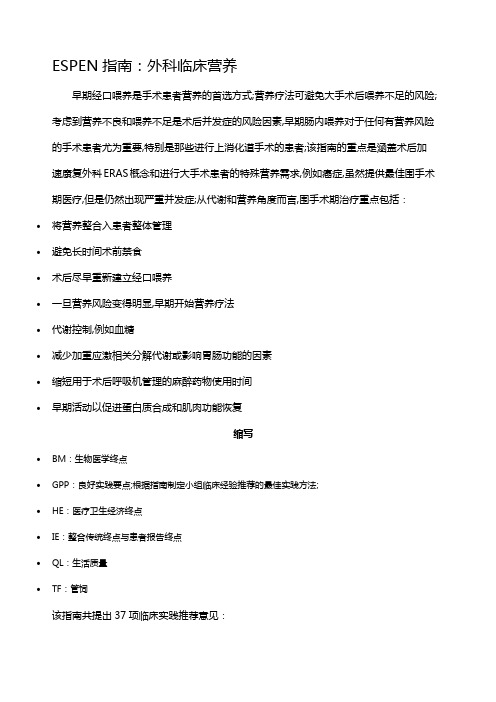
ESPEN指南:外科临床营养早期经口喂养是手术患者营养的首选方式;营养疗法可避免大手术后喂养不足的风险;考虑到营养不良和喂养不足是术后并发症的风险因素,早期肠内喂养对于任何有营养风险的手术患者尤为重要,特别是那些进行上消化道手术的患者;该指南的重点是涵盖术后加速康复外科ERAS概念和进行大手术患者的特殊营养需求,例如癌症,虽然提供最佳围手术期医疗,但是仍然出现严重并发症;从代谢和营养角度而言,围手术期治疗重点包括:•将营养整合入患者整体管理•避免长时间术前禁食•术后尽早重新建立经口喂养•一旦营养风险变得明显,早期开始营养疗法•代谢控制,例如血糖•减少加重应激相关分解代谢或影响胃肠功能的因素•缩短用于术后呼吸机管理的麻醉药物使用时间•早期活动以促进蛋白质合成和肌肉功能恢复缩写•BM:生物医学终点•GPP:良好实践要点;根据指南制定小组临床经验推荐的最佳实践方法;•HE:医疗卫生经济终点•IE:整合传统终点与患者报告终点•QL:生活质量•TF:管饲该指南共提出37项临床实践推荐意见:1.对大多数患者从午夜开始术前禁食是不必要的;被认为无任何误吸风险的手术患者在麻醉前两个小时应喝清流质;麻醉前六小时前应允许进食固体食物BM、IE、QL;推荐等级:A,高度共识97%同意2.为了减少围术期不适症状包括焦虑,前一天晚上和术前两小时应给予经口进食碳水化合物处理而非夜间禁食B,QL;为改善术后胰岛素抵抗和缩短住院时间,对大手术患者可考虑术前使用碳水化合物0,BM、HE;推荐等级:A/B,高度共识100%同意在完成过程中由工作小组根据最新荟萃分析下调等级工作小组内成员100%同意3.一般情况下,术后经口营养摄入应持续不中断BM、IE;推荐等级:A,高度共识90%同意4.建议根据个人耐受性和实施的手术类型来调整经口摄入,特别关注老年患者;推荐等级:GPP,高度共识100%同意5.大多数患者应在术后数小时内开始经口进食清流质;推荐等级:A,高度共识100%同意6.建议在大手术前后评定营养状况;推荐等级:GPP,高度共识100%同意7.营养不良患者和存在营养风险的患者有指征进行围手术期营养疗法;如果预计患者在围手术期不能进食超过5天,也应启动围手术期营养疗法;预计患者经口摄入少,不能维持推荐摄入量的50%以上超过7天也是指征;在这些情况下,建议立即给予营养疗法首选肠内途径ONS或TF;推荐等级:GPP,高度共识92%同意8.如果能量和营养需求不能仅通过经口和肠道摄入满足<能量需求的50%超过7天,建议肠内联合肠外营养GPP;如果有营养疗法指征,但有肠内营养禁忌证如肠梗阻A,应尽快给予肠外营养BM;推荐等级:GPP/A,高度共识100%同意9.对使用肠外营养,应首选全合一三腔袋或药房配制,而非多瓶输注系统BM、HE;推荐等级:B,高度共识100%同意10.推荐按标准化操作流程SOP进行营养支持,以确保有效的营养支持疗法;推荐等级:GPP,高度共识100%同意11.对因肠内喂养不足而需要专用PN的患者可考虑静脉补充谷氨酰胺0,BM、HE;推荐等级B,共识76%同意,在完成过程中由工作小组根据最近的PRCT下调等级工作小组内成员100%同意12.仅对因肠内喂养不足而需要肠外营养的患者应考虑术后肠外营养包括使用ω-3脂肪酸BM、HE;推荐等级:B,大多数同意65%同意13.对接受癌症大手术营养不良的患者应在围手术期或至少术后使用富含免疫营养素精氨酸、ω-3脂肪酸、核苷酸的特定配方B,BM、HE;目前没有明确的证据表明在围手术期使用这些富含免疫营养素的配方优于标准的口服营养补充剂;推荐等级:B/0,共识89%同意14.有严重营养风险的患者应在大手术前接受营养疗法A,即使手术,包括那些癌症,必须推迟BM;这个时间为7~14天是合适的;推荐等级:A/0,高度共识95%同意15.只要可行,应首选经口/肠内途径A,BM、HE、QL;推荐等级:A,高度共识100%同意16.当患者从正常的食物中获取的能量不能满足需求,建议鼓励这些患者术前采取口服营养补充剂,不管他们的营养状况如何;推荐等级:GPP,共识86%同意17.术前应对所有营养不良的癌症患者和进行腹部大手术的高风险患者给予口服营养补充剂BM、HE;患肌肉减少症的老年人是一群特殊的高风险患者;推荐等级:A,高度共识97%同意18.免疫调节型口服营养补充剂包括精氨酸、ω-3脂肪酸和核苷酸可首选0,BM、HE,术前使用5~7天GPP;推荐等级:0/GPP,大多数同意,64%同意19.术前肠内营养/口服营养补充剂应在入院前使用,以避免不必要的住院治疗和降低院内感染的风险BM、HE、QL;推荐等级:GPP,高度共识91%同意20.术前PN只用于营养不良患者或存在严重营养风险而能量需求不能通过EN完全满足的患者A,BM;建议使用7~14天;推荐等级:A/0,高度共识100%同意21.对不能早期开始经口营养摄入、经口摄入不足<50%超过7天的患者应尽早启动TF24小时内;特别高风险人群包括:接受头颈部或胃肠癌症大手术的患者A,BM严重创伤包括颅脑损伤的患者A,BM手术时有明显营养不良的患者A,BM,GPP推荐等级:A/GPP,高度共识97%同意22.对大多数患者,标准整蛋白配方是合适的;为避免因技术原因堵管和感染风险,一般不建议使用厨房制备的膳食匀浆膳进行TF;推荐等级:GPP,高度共识94%同意23.至于营养不良患者的特殊方面,对所有接受上消化道和胰腺大手术患者进行TF应考虑放置鼻空肠管NJ或行针刺导管空肠造口术NCJ,BM;推荐等级:B,高度共识95%同意24.如有TF指征,应在术后24小时内启动BM;推荐等级:A,高度共识91%同意25.建议以较慢的输注速率开始TF如10~最大20ml/h,由于肠道耐受性有限,增加输注速率要谨慎、个体化;达到目标摄入量的时间差别会很大,可能需要5~7天;推荐等级:GPP,共识85%同意26.如果必须长期TF>4周,如重症颅脑损伤,建议经皮置管如经皮内镜下胃造口—PEG;推荐等级:GPP,高度共识94%同意27.如必要,在住院期间定期评定营养状况,建议围手术期接受营养疗法和通过经口途径仍不能满足能量需求的患者出院后继续营养疗法包括合理的膳食指导;推荐等级:GPP,高度共识97%同意28.营养不良是影响移植后预后的主要因素,因此建议对营养状况进行监测;对营养不良患者,建议给予额外的口服营养补充剂甚至TF;推荐等级:GPP,高度共识100%同意29.在对等待移植的患者进行监测时,必须定期评定营养状况和给予合理的膳食指导建议;推荐等级:GPP,高度共识100%同意30.对活体供者和受者的推荐意见与腹部大手术患者相同;推荐等级:GPP,高度共识97%同意31.心脏、肺、肝、胰、肾移植术后,建议在24小时内尽早摄入正常食物或进行肠内营养;推荐等级:GPP,高度共识100%同意32.即使在小肠移植后,肠内营养也可尽早启动,但在第一周内加量应非常小心;推荐等级:GPP,高度共识93%同意33.必要时应肠内联合肠外营养;建议对所有移植患者进行长期营养监测和合理的膳食指导;推荐等级:GPP,高度共识100%同意34.减肥手术后建议早期经口摄入;推荐等级:0,高度共识100%同意35.简单的减肥手术不需要肠外营养;推荐等级:0,高度共识100%同意36.万一出现较大并发症需要再次开腹手术,可考虑使用鼻空肠管/针刺导管空肠造口术;推荐等级:0,共识87%同意37.更多的推荐意见与那些接受腹部大手术的患者相同;推荐等级:0,高度共识94%同意Clin Nutr. 2017 Jun;363:623-650.ESPEN guideline: Clinical nutrition in surgery.Weimann A, Braga M, Carli F, Higashiguchi T, Hübner M, Klek S, Laviano A, Ljungqvist O, Lobo DN, Martindale R, Waitzberg DL, Bischoff SC, Singer P.Klinikum St. Georg, Leipzig, Germany; San Raffaele Hospital, Milan, Italy; McGill University, Montreal General Hospital, Montreal, Canada; Fujita Health University, Toyoake, Aichi, Japan;Centre Hospitalier Universitaire Vaudois CHUV, Lausanne, Switzerland; Stanley Dudrick's Memorial Hospital, Skawina, Krakau, Poland; Universita "La Sapienza" Roma, Roma, Italy;Orebro University, Orebro, Sweden; Nottingham University Hospitals and University of Nottingham, Queen's Medical Centre, Nottingham, UK; Oregon Health & Science University, Portland, OR, USA; University of Sao Paulo, Sao Paulo, Brazil; Universitat Hohenheim,Stuttgart, Germany; Rabin Medical Center, Beilinson Hospital, Petah Tikva, Israel.Early oral feeding is the preferred mode of nutrition for surgical patients.Avoidance of any nutritional therapy bears the risk of underfeeding during the postoperative course after major surgery. Considering that malnutrition and underfeeding are risk factors for postoperative complications, early enteralfeeding is especially relevant for any surgical patient at nutritional risk, especially for those undergoing upper gastrointestinal surgery. The focus of this guideline is to cover nutritional aspects of the Enhanced Recovery After Surgery ERAS concept and the special nutritional needs of patients undergoing major surgery, .for cancer, and of those developing severe complications despite bestperioperative care. From a metabolic and nutritional point of view, the keyaspects of perioperative care include:•integration of nutrition into the overall management of the patient •avoidance of long periods of preoperative fasting•re-establishment of oral feeding as early as possible after surgery•start of nutritional therapy early, as soon as a nutritional risk becomes apparent •metabolic control . of blood glucose•reduction of factors which exacerbate stress-related catabolism or impair gastrointestinal function•minimized time on paralytic agents for ventilator management in the postoperative period•early mobilisation to facilitate protein synthesis and muscle function The guideline presents 37 recommendations for clinical practice.BM: biomedical endpointsGPP: Good practice points. Recommended best practice based on the clinical experience of the guideline development groupHE: health care economy endpointIE: integration of classical and patient-reported endpointsQL: quality of lifeTF: tube feeding1.Preoperative fasting from midnight is unnecessary in most patients. Patientsundergoing surgery, who are considered to have no specific risk of aspiration, shall drink clear fluids until two hours before anaesthesia. Solids shall be allowed until six hours before anaesthesia BM, IE, QL. Grade of recommendation A - strong consensus 97% agreement2.In order to reduce perioperative discomfort including anxiety oral preoperativecarbohydrate treatment instead of overnight fasting the night before and two hours before surgery should be administered B QL. To impact postoperative insulin resistance and hospital length of stay, preoperative carbohydrates can be considered in patients undergoing major surgery 0 BM, HE. ConsensusConference: Grade of recommendation A/B - strong consensus 100%agreement- downgraded by the working group during the finalization process according to the very recent meta-analysis with 100% agreement within the working group members3.In general, oral nutritional intake shall be continued after surgery withoutinterruption BM, IE. Grade of recommendation A - strong consensus 90%agreement4.It is recommended to adapt oral intake according to individual tolerance and tothe type of surgery carried out with special caution to elderly patients. Grade of recommendation GPP - strong consensus 100% agreement5.Oral intake, including clear liquids, shall be initiated within hours after surgery inmost patients. Grade of recommendation A - strong consensus 100% agreement 6.It is recommended to assess the nutritional status before and after major surgery.Grade of recommendation GPP - strong consensus 100% agreement7.Perioperative nutritional therapy is indicated in patients with malnutrition andthose at nutritional risk. Perioperative nutritional therapy should also be initiated, if it is anticipated that the patient will be unable to eat for more than five days perioperatively. It is also indicated in patients expected to have low oral intake and who cannot maintain above 50% of recommended intake for more than seven days. In these situations, it is recommended to initiate nutritional therapy preferably by the enteral route - ONS-TF without delay. Grade ofrecommendation GPP - strong consensus 92% agreement8.If the energy and nutrient requirements cannot be met by oral and enteral intakealone <50% of caloric requirement for more than seven days, a combination of enteral and parenteral nutrition is recommended GPP. Parenteral nutrition shall be administered as soon as possible if nutrition therapy is indicated and there isa contraindication for enteral nutrition, such as in intestinal obstruction A BM.Grade of recommendation GPP/A - strong consensus 100% agreement9.For administration of parenteral nutrition an all-in-one three-chamber bag orpharmacy prepared should be preferred instead of multibottle system BM, HE.Grade of recommendation B - strong consensus 100% agreement10.S tandardised operating procedures SOP for nutritional support arerecommended to secure an effective nutritional support therapy. Grade ofrecommendation GPP - strong consensus 100% agreement11.P arenteral glutamine supplementation may be considered in patients whocannot be fed adequately enterally and, therefore, require exclusive PN 0 BM, HE.Consensus Conference: Grade of recommendation B - consensus 76%agreement - downgraded by the working group during the finalization process according to the recent PRCT with 100% agreement within the working group members.12.P ostoperative parenteral nutrition including omega-3-fatty acids should beconsidered only in patients who cannot be adequately fed enterally and,therefore, require parenteral nutrition BM, HE. Grade of recommendation B - majority agreement 65% agreement13.P eri- or at least postoperative administration of specific formula enriched withimmunonutrients arginine, omega-3-fatty acids, ribonucleotides should begiven in malnourished patients undergoing major cancer surgery B BM, HE.There is currently no clear evidence for the use of these formulae enriched with immunonutrients vs. standard oral nutritional supplements exclusively in the preoperative period. Grade of recommendation B/0 - consensus 89% agreement 14.P atients with severe nutritional risk shall receive nutritional therapy prior tomajor surgery A even if operations including those for cancer have to be delayed BM. A period of 7-14 days may be appropriate. Grade of recommendation A/0 - strong consensus 95% agreement15.W henever feasible, the oral/enteral route shall be preferred A BM, HE, QL. Gradeof recommendation A - strong consensus 100% agreement16.W hen patients do not meet their energy needs from normal food it isrecommended to encourage these patients to take oral nutritional supplements during the preoperative period unrelated to their nutritional status. Grade of recommendation GPP - consensus 86% agreement17.P reoperatively, oral nutritional supplements shall be given to all malnourishedcancer and high-risk patients undergoing major abdominal surgery BM, HE. A special group of high-risk patients are the elderly people with sarcopenia. Grade of recommendation A - strong consensus 97% agreement18.I mmune modulating oral nutritional supplements including arginine, omega-3fatty acids and nucleotides can be preferred 0 BM, HE and administered for fiveto seven days preoperatively GPP. Grade of recommendation 0/GPP - majority agreement, 64% agreement19.P reoperative enteral nutrition/oral nutritional supplements should preferably beadministered prior to hospital admission to avoid unnecessary hospitalization and to lower the risk of nosocomial infections BM, HE, QL. Grade ofrecommendation GPP - strong consensus 91% agreement20.P reoperative PN shall be administered only in patients with malnutrition orsevere nutritional risk where energy requirement cannot be adequately met by EN A BM. A period of 7-14 days is recommended. Grade of recommendation A/0 - strong consensus 100% agreement21.E arly tube feeding within 24 h shall be initiated in patients in whom early oralnutrition cannot be started, and in whom oral intake will be inadequate <50% for more than 7 days. Special risk groups are: patients undergoing major head and neck or gastrointestinal surgery for cancer A BM patients with severe trauma including brain injury A BM patients with obvious malnutrition at the time of surgery A BM GPP. Grade of recommendation A/GPP - strong consensus 97% agreement22.I n most patients, a standard whole protein formula is appropriate. For technicalreasons with tube clotgging and the risk of infection the use of kitchen-made blenderized diets for tube feeding is not recommended in general. Grade of recommendation GPP - strong consensus 94% agreement23.W ith special regard to malnourished patients, placement of a nasojejunal tubeNJ or needle catheter jejunostomy NCJ should be considered for all candidates for tube feeding undergoing major upper gastrointestinal and pancreaticsurgery BM. Grade of recommendation B - strong consensus 95% agreement 24.I f tube feeding is indicated, it shall be initiated within 24 h after surgery BM.Grade of recommendation A - strong consensus 91% agreement25.I t is recommended to start tube feeding with a low flow rate . 10 - max. 20 ml/hand to increase the feeding rate carefully and individually due to limitedintestinal tolerance. The time to reach the target intake can be very different, and may take five to seven days. Grade of recommendation GPP - consensus 85% agreement26.I f long term TF >4 weeks is necessary, . in severe head injury, placement of apercutaneous tube . percutaneous endoscopic gastrostomy - PEG isrecommended. Grade of recommendation GPP - strong consensus 94%agreement27.R egular reassessment of nutritional status during the stay in hospital and, ifnecessary, continuation of nutrition therapy including qualified dietarycounselling after discharge, is advised for patients who have received nutrition therapy perioperatively and still do not cover appropriately their energyrequirements via the oral route. Grade of recommendation GPP - strongconsensus 97% agreement28.M alnutrition is a major factor influencing outcome after transplantation, somonitoring of the nutritional status is recommended. In malnutrition, additional oral nutritional supplements or even tube feeding is advised. Grade ofrecommendation GPP - strong consensus 100% agreement29.R egular assessment of nutritional status and qualified dietary counselling shallbe required while monitoring patients on the waiting list before transplantation.Grade of recommendation GPP - strong consensus 100% agreement30.R ecommendations for the living donor and recipient are not different fromthose for patients undergoing major abdominal surgery. Grade ofrecommendation GPP - strong consensus 97% agreement31.A fter heart, lung, liver, pancreas, and kidney transplantation, early intake ofnormal food or enteral nutrition is recommended within 24 h. Grade ofrecommendation GPP - strong consensus 100% agreement32.E ven after transplantation of the small intestine, enteral nutrition can be initiatedearly, but should be increased very carefully within the first week. Grade ofrecommendation GPP - strong consensus 93% agreement33.I f necessary enteral and parenteral nutrition should be combined. Long-termnutritional monitoring and qualified dietary counselling are recommended for all transplants. Grade of recommendation GPP - strong consensus 100% agreement 34.E arly oral intake can be recommended after bariatric surgery. Grade ofrecommendation 0 - strong consensus 100% agreement35.P arenteral nutrition is not required in uncomplicated bariatric surgery. Grade ofrecommendation 0 - strong consensus 100% agreement36.I n case of a major complication with relaparotomy the use of a nasojejunaltube/needle catheter jejunostomy may be considered. Grade ofrecommendation 0 - consensus 87% agreement37.F urther recommendations are not different from those for patients undergoingmajor abdominal surgery. Grade of recommendation 0 - strong consensus 94% agreementKEYWORDS: ERAS; Enteral nutrition; Parenteral nutrition; Perioperative nutrition;Prehabilitation; SurgeryPMIDPII: S0261-56141730063-8DOI。
2020年ESPEN急慢性胰腺炎临床营养指南要点

2020年ESPEN急慢性胰腺炎临床营养指南要点(上)急性和慢性胰腺炎都是胰腺常见病,虽然是良性的,但与营养不良的风险显著相关,可能需要营养支持。
然而,虽已有胰腺疾病相关指南发表,但在营养支持方面仍缺乏专门的共识。
2020年1月,欧洲临床营养和代谢学会(ESPEN)发布了急慢性胰腺炎的临床营养指南。
本文翻译了指南中的摘要、前言、急性胰腺炎的营养管理流程以及急慢性胰腺炎的临床营养推荐意见,分享如下。
急性胰腺炎急性胰腺炎是常见的需要住院治疗的急性消化道疾病,多数病例(约80%) 预后良好。
然而,急性坏死性胰腺炎占急性胰腺炎的比例高达20%,并与早期器官衰竭(38%)、需要干预(38%)和死亡(15%)的发生率显著相关。
在急性坏死性胰腺炎的情况下,分解代谢非常高,因此营养支持是疾病管理的基石之一。
大量的研究表明在发生急性坏死性胰腺炎时,相比肠外营养,肠内营养显示了优越性。
但关于肠内营养的时间、途径和类型以及经口再喂养的问题仍然是临床研究的对象。
附图急性胰腺炎营养管理流程图哪些急性胰腺炎患者被认为有营养风险?声明1:由于急性胰腺炎的高分解代谢特性以及营养状况对疾病发展的影响,患者有中度至高度营养风险。
推荐意见1:预测为轻度至中度急性胰腺炎的所有患者都应使用有效的筛查方法进行筛查,如营养风险筛查工具(NRS- 2002);预测为重度急性胰腺炎的患者均应考虑其存在营养风险。
预测为轻度急性胰腺炎的患者早期经口喂养是否可行?推荐意见2:预测为轻度急性胰腺炎的患者,无论血清脂肪酶水平如何,一旦临床耐受,应尽早给予经口喂养。
推荐意见3:轻度急性胰腺炎患者重新开始经口喂养时应使用低脂、软食。
如有需要,急性胰腺炎患者首选什么类型的医疗营养(肠内或肠外)?推荐意见4:不能经口喂养的急性胰腺炎患者,肠内营养应优先于肠外营养。
急性胰腺炎患者启动肠内营养的最佳时机是什么?推荐意见5:在入院后24~72小时内,应尽早开启肠内营养,以防止经口喂养不耐受。
欧洲肠外肠内营养学会肠内营养指南
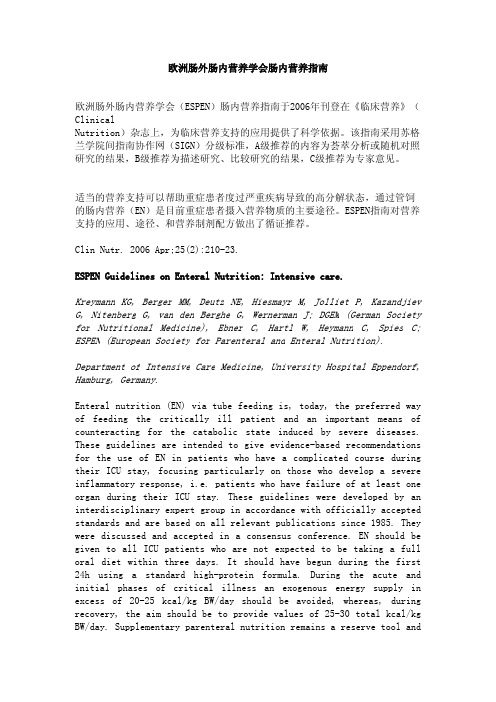
欧洲肠外肠内营养学会肠内营养指南欧洲肠外肠内营养学会(ESPEN)肠内营养指南于2006年刊登在《临床营养》(ClinicalNutrition)杂志上,为临床营养支持的应用提供了科学依据。
该指南采用苏格兰学院间指南协作网(SIGN)分级标准,A级推荐的内容为荟萃分析或随机对照研究的结果,B级推荐为描述研究、比较研究的结果,C级推荐为专家意见。
适当的营养支持可以帮助重症患者度过严重疾病导致的高分解状态,通过管饲的肠内营养(EN)是目前重症患者摄入营养物质的主要途径。
ESPEN指南对营养支持的应用、途径、和营养制剂配方做出了循证推荐。
Clin Nutr. 2006 Apr;25(2):210-23.ESPEN Guidelines on Enteral Nutrition: Intensive care.Kreymann KG, Berger MM, Deutz NE, Hiesmayr M, Jolliet P, Kazandjiev G, Nitenberg G, van den Berghe G, Wernerman J; DGEM (German Society for Nutritional Medicine), Ebner C, Hartl W, Heymann C, Spies C; ESPEN (European Society for Parenteral and Enteral Nutrition). Department of Intensive Care Medicine, University Hospital Eppendorf, Hamburg, Germany.Enteral nutrition (EN) via tube feeding is, today, the preferred way of feeding the critically ill patient and an important means of counteracting for the catabolic state induced by severe diseases. These guidelines are intended to give evidence-based recommendations for the use of EN in patients who have a complicated course during their ICU stay, focusing particularly on those who develop a severe inflammatory response, i.e. patients who have failure of at least one organ during their ICU stay. These guidelines were developed by an interdisciplinary expert group in accordance with officially accepted standards and are based on all relevant publications since 1985. They were discussed and accepted in a consensus conference. EN should be given to all ICU patients who are not expected to be taking a full oral diet within three days. It should have begun during the first 24h using a standard high-protein formula. During the acute and initial phases of critical illness an exogenous energy supply in excess of 20-25 kcal/kg BW/day should be avoided, whereas, during recovery, the aim should be to provide values of 25-30 total kcal/kg BW/day. Supplementary parenteral nutrition remains a reserve tool andshould be given only to those patients who do not reach their target nutrient intake on EN alone. There is no general indication for immune-modulating formulae in patients with severe illness or sepsis and an APACHE II Score >15. Glutamine should be supplemented in patients suffering from burns or trauma. 营养支持的应用所有3天内无法通过经口进食满足营养需求的重症患者需要接受肠内营养(C级推荐)。
《ESPEN重症病人营养指南(2023版)》解读PPT课件

营养与药物治疗的相互作用
注意营养支持与药物治疗之间的相互作用,避免不良影响。
营养支持的监测与评估
定期对重症病人的营养状况进行监测和评估,及时调整营养支持策 略。
05 营养相关并发症的预防与 处理
胃肠道并发症
01
呕吐和腹泻
促进康复
营养支持有助于加速重症病人的康复进程,缩短住院时间。
提高生活质量
通过改善营养状况,可以提高重症病人的生活质量,增强其抵抗 力和免疫力。
03 营养评估与监测
营养风险筛查
01
营养风险定义
营养风险是指由于疾病、应激或 治疗导致的营养状况恶化的可能 性。
筛查工具
02
03
筛查时机
推荐使用NRS-2002、MUST等 营养风险筛查工具,对重症病人 进行快速、准确的营养风险筛查 。
07 总结与展望
ESPEN重症病人营养指南的意义与价值
提供专业指导
ESPEN重症病人营养指南为临床医生、营养师和重症监护团队提供 了关于重症病人营养管理的最新、最全面的建议和指导。
改善病人预后
通过优化营养支持,指南有助于改善重症病人的临床预后,降低并 发症风险,并促进康复。
推动学科发展
指南的制定和更新反映了重症医学和临床营养学领域的最新进展, 推动了相关学科的持续发展。
肠外营养
肠外营养的时机
01
当肠内营养无法满足病人营养需求或存在禁忌时,应考虑肠外
营养。
营养液的选择
02
根据病人的病情和营养需求选择合适的肠外营养液,包括脂肪
乳、氨基酸、葡萄糖、维生素、矿物质等。
并发症的预防
ESPEN指南:IBD患者的临床营养(五)

ESPEN指南:IBD患者的临床营养(五)人工营养的途径取决于多个方面,包括患者摄食能力、胃肠道吸收功能、患者营养状况和治疗目标(支持护理、治疗营养不良、诱导缓解、维持缓解),还应考虑到选择什么样的配方以及饮食调节对IBD患者肠道免疫的作用和其潜在的临床影响。
口服营养补充(ONS)是IBD患者营养治疗的第一步,作为正常饮食外的小量支持疗法。
对成人来说,在正常饮食基础上,ONS额外补充600kcal/d。
使用标准配方或流质进行肠内营养优于肠外营养,除非存在EN禁忌。
若经口饮食不能,应考虑进行鼻胃管或鼻肠管进行肠内喂养。
当患者胃肠道功能存在但无法吞咽时,应当考虑肠内营养。
当肠道不能满足患者目标营养需求时,应补充性PN。
存在肠梗阻并且在远端无法安置喂养管或者安置失败时使用PN。
短肠患者存在严重的营养素吸收障碍和/或水和电解质丢失时需要使用PN。
手术患者出现上述症状时也需要使用PN,患者出现EN不耐受或者EN途径不能够维持营养状况时需要PN补充。
需要PN的大多是那些存在并发症的患者。
问16:活动期CD患者能否从营养治疗(EN、PN)中获益?推荐16:对于儿童和青少年CD患者,单一肠内营养(EEN)是有效的,被推荐为诱导急性活动期缓解的一线治疗。
推荐等级:B—强共识(92%赞同)不少被视为低质量的临床研究结果却有力的支持营养治疗诱导缓解有效,且缓解率高于安慰剂反应。
因此,推荐所有活动期CD患者考虑单一肠内营养(EEN)治疗,并且可作为替代激素治疗高风险者的第一选择。
先前Meta分析显示激素诱导缓解的效果比EEN好,但是儿科优选EEN且在很多情况下EEN是第一选择。
首先,营养不良不利于生长发育;其次,既然生长发育对儿童尤其重要,那么更应该避免激素及激素的副作用;再者,最重要的是在儿科研究中发现激素和EEN诱导缓解的疗效相似,而且在某些情况下(同时进行免疫调节治疗),对儿童患者来说,EEN优于激素治疗。
然而这些研究方法论存在缺限,包括缺乏随机和回顾性分析。
ESPEN指南外科临床营养

E S P E N指南外科临床营养Document serial number【LGGKGB-LGG98YT-LGGT8CB-LGUT-ESPEN指南:外科临床营养早期经口喂养是手术患者营养的首选方式。
营养疗法可避免大手术后喂养不足的风险。
考虑到营养不良和喂养不足是术后并发症的风险因素,早期肠内喂养对于任何有营养风险的手术患者尤为重要,特别是那些进行上消化道手术的患者。
该指南的重点是涵盖术后加速康复外科(ERAS)概念和进行大手术患者的特殊营养需求,例如癌症,虽然提供最佳围手术期医疗,但是仍然出现严重并发症。
从代谢和营养角度而言,围手术期治疗重点包括:•将营养整合入患者整体管理•避免长时间术前禁食•术后尽早重新建立经口喂养•一旦营养风险变得明显,早期开始营养疗法•代谢控制,例如血糖•减少加重应激相关分解代谢或影响胃肠功能的因素•缩短用于术后呼吸机管理的麻醉药物使用时间•早期活动以促进蛋白质合成和肌肉功能恢复缩写•BM:生物医学终点•GPP:良好实践要点。
根据指南制定小组临床经验推荐的最佳实践方法。
•HE:医疗卫生经济终点•IE:整合传统终点与患者报告终点•QL:生活质量•TF:管饲该指南共提出37项临床实践推荐意见:1.对大多数患者从午夜开始术前禁食是不必要的。
被认为无任何误吸风险的手术患者在麻醉前两个小时应喝清流质。
麻醉前六小时前应允许进食固体食物(BM、IE、QL)。
推荐等级:A,高度共识(97%同意)2.为了减少围术期不适症状包括焦虑,前一天晚上和术前两小时应给予经口进食碳水化合物处理(而非夜间禁食)(B,QL)。
为改善术后胰岛素抵抗和缩短住院时间,对大手术患者可考虑术前使用碳水化合物(0,BM、HE)。
推荐等级:A/B,高度共识(100%同意)在完成过程中由工作小组根据最新荟萃分析下调等级(工作小组内成员100%同意)3.一般情况下,术后经口营养摄入应持续不中断(BM、IE)。
推荐等级:A,高度共识(90%同意)4.建议根据个人耐受性和实施的手术类型来调整经口摄入,特别关注老年患者。
ESPEN指南:外科手术中的临床营养精选全文完整版
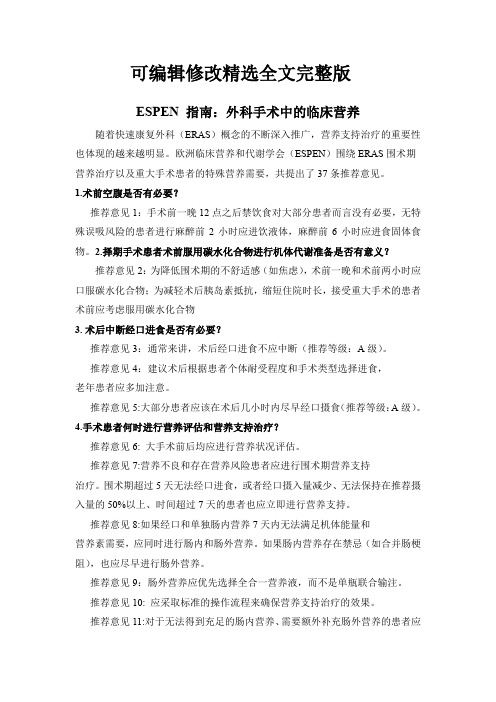
可编辑修改精选全文完整版ESPEN 指南:外科手术中的临床营养随着快速康复外科(ERAS)概念的不断深入推广,营养支持治疗的重要性也体现的越来越明显。
欧洲临床营养和代谢学会(ESPEN)围绕ERAS围术期营养治疗以及重大手术患者的特殊营养需要,共提出了37条推荐意见。
1.术前空腹是否有必要?推荐意见1:手术前一晚12点之后禁饮食对大部分患者而言没有必要,无特殊误吸风险的患者进行麻醉前2小时应进饮液体,麻醉前6小时应进食固体食物。
2.择期手术患者术前服用碳水化合物进行机体代谢准备是否有意义?推荐意见2:为降低围术期的不舒适感(如焦虑),术前一晚和术前两小时应口服碳水化合物;为减轻术后胰岛素抵抗,缩短住院时长,接受重大手术的患者术前应考虑服用碳水化合物3.术后中断经口进食是否有必要?推荐意见3:通常来讲,术后经口进食不应中断(推荐等级:A级)。
推荐意见4:建议术后根据患者个体耐受程度和手术类型选择进食,老年患者应多加注意。
推荐意见5:大部分患者应该在术后几小时内尽早经口摄食(推荐等级:A级)。
4.手术患者何时进行营养评估和营养支持治疗?推荐意见6: 大手术前后均应进行营养状况评估。
推荐意见7:营养不良和存在营养风险患者应进行围术期营养支持治疗。
围术期超过5天无法经口进食,或者经口摄入量减少、无法保持在推荐摄入量的50%以上、时间超过7天的患者也应立即进行营养支持。
推荐意见8:如果经口和单独肠内营养7天内无法满足机体能量和营养素需要,应同时进行肠内和肠外营养。
如果肠内营养存在禁忌(如合并肠梗阻),也应尽早进行肠外营养。
推荐意见9:肠外营养应优先选择全合一营养液,而不是单瓶联合输注。
推荐意见10: 应采取标准的操作流程来确保营养支持治疗的效果。
推荐意见11:对于无法得到充足的肠内营养、需要额外补充肠外营养的患者应考虑肠外补充谷氨酰胺。
5.有没有证据表明肠外营养需要补充w-3脂肪酸?推荐意见12:术后肠外营养补充w-3脂肪酸只限于那些对于无法得到充足的肠内营养、需要额外补充肠外营养的患者6.有没有专门的经口/肠内营养配方进行免疫营养素的补充?推荐意见13:癌症重大手术营养不良的患者围术期或者术后应补采用富含免疫营养素(如精氨酸、w-3脂肪酸、核糖核苷酸)的配方。
- 1、下载文档前请自行甄别文档内容的完整性,平台不提供额外的编辑、内容补充、找答案等附加服务。
- 2、"仅部分预览"的文档,不可在线预览部分如存在完整性等问题,可反馈申请退款(可完整预览的文档不适用该条件!)。
- 3、如文档侵犯您的权益,请联系客服反馈,我们会尽快为您处理(人工客服工作时间:9:00-18:30)。
ESPEN指南:外科临床营养早期经口喂养是手术患者营养的首选方式。
营养疗法可避免大手术后喂养不足的风险。
考虑到营养不良和喂养不足是术后并发症的风险因素,早期肠内喂养对于任何有营养风险的手术患者尤为重要,特别是那些进行上消化道手术的患者。
该指南的重点是涵盖术后加速康复外科(ERAS)概念和进行大手术患者的特殊营养需求,例如癌症,虽然提供最佳围手术期医疗,但是仍然出现严重并发症。
从代谢和营养角度而言,围手术期治疗重点包括:•将营养整合入患者整体管理•避免长时间术前禁食•术后尽早重新建立经口喂养•一旦营养风险变得明显,早期开始营养疗法•代谢控制,例如血糖•减少加重应激相关分解代谢或影响胃肠功能的因素•缩短用于术后呼吸机管理的麻醉药物使用时间•早期活动以促进蛋白质合成和肌肉功能恢复缩写•BM:生物医学终点•GPP:良好实践要点。
根据指南制定小组临床经验推荐的最佳实践方法。
•HE:医疗卫生经济终点•IE:整合传统终点与患者报告终点•QL:生活质量•TF:管饲该指南共提出37项临床实践推荐意见:1.对大多数患者从午夜开始术前禁食是不必要的。
被认为无任何误吸风险的手术患者在麻醉前两个小时应喝清流质。
麻醉前六小时前应允许进食固体食物(BM、IE、QL)。
推荐等级:A,高度共识(97%同意)2.为了减少围术期不适症状包括焦虑,前一天晚上和术前两小时应给予经口进食碳水化合物处理(而非夜间禁食)(B,QL)。
为改善术后胰岛素抵抗和缩短住院时间,对大手术患者可考虑术前使用碳水化合物(0,BM、HE)。
推荐等级:A/B,高度共识(100%同意)在完成过程中由工作小组根据最新荟萃分析下调等级(工作小组内成员100%同意)3.一般情况下,术后经口营养摄入应持续不中断(BM、IE)。
推荐等级:A,高度共识(90%同意)4.建议根据个人耐受性和实施的手术类型来调整经口摄入,特别关注老年患者。
推荐等级:GPP,高度共识(100%同意)5.大多数患者应在术后数小时内开始经口进食清流质。
推荐等级:A,高度共识(100%同意)6.建议在大手术前后评定营养状况。
推荐等级:GPP,高度共识(100%同意)7.营养不良患者和存在营养风险的患者有指征进行围手术期营养疗法。
如果预计患者在围手术期不能进食超过5天,也应启动围手术期营养疗法。
预计患者经口摄入少,不能维持推荐摄入量的50%以上超过7天也是指征。
在这些情况下,建议立即给予营养疗法(首选肠内途径ONS或TF)。
推荐等级:GPP,高度共识(92%同意)8.如果能量和营养需求不能仅通过经口和肠道摄入满足(<能量需求的50%)超过7天,建议肠内联合肠外营养(GPP)。
如果有营养疗法指征,但有肠内营养禁忌证如肠梗阻(A),应尽快给予肠外营养(BM)。
推荐等级:GPP/A,高度共识(100%同意)9.对使用肠外营养,应首选全合一(三腔袋或药房配制),而非多瓶输注系统(BM、HE)。
推荐等级:B,高度共识(100%同意)10.推荐按标准化操作流程(SOP)进行营养支持,以确保有效的营养支持疗法。
推荐等级:GPP,高度共识(100%同意)11.对因肠内喂养不足而需要专用PN的患者可考虑静脉补充谷氨酰胺(0,BM、HE)。
推荐等级B,共识(76%同意),在完成过程中由工作小组根据最近的PRCT下调等级(工作小组内成员100%同意)12.仅对因肠内喂养不足而需要肠外营养的患者应考虑术后肠外营养包括使用ω-3脂肪酸(BM、HE)。
推荐等级:B,大多数同意(65%同意)13.对接受癌症大手术营养不良的患者应在围手术期或至少术后使用富含免疫营养素(精氨酸、ω-3脂肪酸、核苷酸)的特定配方(B,BM、HE)。
目前没有明确的证据表明在围手术期使用这些富含免疫营养素的配方优于标准的口服营养补充剂。
推荐等级:B/0,共识(89%同意)14.有严重营养风险的患者应在大手术前接受营养疗法(A),即使手术,包括那些癌症,必须推迟(BM)。
这个时间为7~14天是合适的。
推荐等级:A/0,高度共识(95%同意)15.只要可行,应首选经口/肠内途径(A,BM、HE、QL)。
推荐等级:A,高度共识(100%同意)16.当患者从正常的食物中获取的能量不能满足需求,建议鼓励这些患者术前采取口服营养补充剂,不管他们的营养状况如何。
推荐等级:GPP,共识(86%同意)17.术前应对所有营养不良的癌症患者和进行腹部大手术的高风险患者给予口服营养补充剂(BM、HE)。
患肌肉减少症的老年人是一群特殊的高风险患者。
推荐等级:A,高度共识(97%同意)18.免疫调节型口服营养补充剂包括精氨酸、ω-3脂肪酸和核苷酸可首选(0,BM、HE),术前使用5~7天(GPP)。
推荐等级:0/GPP,大多数同意,64%同意19.术前肠内营养/口服营养补充剂应在入院前使用,以避免不必要的住院治疗和降低院内感染的风险(BM、HE、QL)。
推荐等级:GPP,高度共识(91%同意)20.术前PN只用于营养不良患者或存在严重营养风险而能量需求不能通过EN完全满足的患者(A,BM)。
建议使用7~14天。
推荐等级:A/0,高度共识(100%同意)21.对不能早期开始经口营养摄入、经口摄入不足(<50%)超过7天的患者应尽早启动TF(24小时内)。
特别高风险人群包括:接受头颈部或胃肠癌症大手术的患者(A,BM)严重创伤包括颅脑损伤的患者(A,BM)手术时有明显营养不良的患者(A,BM,GPP)推荐等级:A/GPP,高度共识(97%同意)22.对大多数患者,标准整蛋白配方是合适的。
为避免因技术原因堵管和感染风险,一般不建议使用厨房制备的膳食(匀浆膳)进行TF。
推荐等级:GPP,高度共识(94%同意)23.至于营养不良患者的特殊方面,对所有接受上消化道和胰腺大手术患者进行TF应考虑放置鼻空肠管(NJ)或行针刺导管空肠造口术(NCJ,BM)。
推荐等级:B,高度共识(95%同意)24.如有TF指征,应在术后24小时内启动(BM)。
推荐等级:A,高度共识(91%同意)25.建议以较慢的输注速率开始TF(如10~最大20ml/h),由于肠道耐受性有限,增加输注速率要谨慎、个体化。
达到目标摄入量的时间差别会很大,可能需要5~7天。
推荐等级:GPP,共识(85%同意)26.如果必须长期TF(>4周),如重症颅脑损伤,建议经皮置管(如经皮内镜下胃造口—PEG)。
推荐等级:GPP,高度共识(94%同意)27.如必要,在住院期间定期评定营养状况,建议围手术期接受营养疗法和通过经口途径仍不能满足能量需求的患者出院后继续营养疗法包括合理的膳食指导。
推荐等级:GPP,高度共识(97%同意)28.营养不良是影响移植后预后的主要因素,因此建议对营养状况进行监测。
对营养不良患者,建议给予额外的口服营养补充剂甚至TF。
推荐等级:GPP,高度共识(100%同意)29.在对等待移植的患者进行监测时,必须定期评定营养状况和给予合理的膳食指导建议。
推荐等级:GPP,高度共识(100%同意)30.对活体供者和受者的推荐意见与腹部大手术患者相同。
推荐等级:GPP,高度共识(97%同意)31.心脏、肺、肝、胰、肾移植术后,建议在24小时内尽早摄入正常食物或进行肠内营养。
推荐等级:GPP,高度共识(100%同意)32.即使在小肠移植后,肠内营养也可尽早启动,但在第一周内加量应非常小心。
推荐等级:GPP,高度共识(93%同意)33.必要时应肠内联合肠外营养。
建议对所有移植患者进行长期营养监测和合理的膳食指导。
推荐等级:GPP,高度共识(100%同意)34.减肥手术后建议早期经口摄入。
推荐等级:0,高度共识(100%同意)35.简单的减肥手术不需要肠外营养。
推荐等级:0,高度共识(100%同意)36.万一出现较大并发症需要再次开腹手术,可考虑使用鼻空肠管/针刺导管空肠造口术。
推荐等级:0,共识(87%同意)37.更多的推荐意见与那些接受腹部大手术的患者相同。
推荐等级:0,高度共识(94%同意)Clin Nutr. 2017 Jun;36(3):623-650.ESPEN guideline: Clinical nutrition in surgery.Weimann A, Braga M, Carli F, Higashiguchi T, Hübner M, Klek S, Laviano A,Ljungqvist O, Lobo DN, Martindale R, Waitzberg DL, Bischoff SC, Singer P.Klinikum St. Georg, Leipzig, Germany; San Raffaele Hospital, Milan, Italy; McGillUniversity, Montreal General Hospital, Montreal, Canada; Fujita Health University, Toyoake, Aichi, Japan; Centre Hospitalier Universitaire Vaudois (CHUV), Lausanne, Switzerland; Stanley Dudrick's Memorial Hospital, Skawina, Krakau, Poland;Universita "La Sapienza" Roma, Roma, Italy; Orebro University, Orebro, Sweden;Nottingham University Hospitals and University of Nottingham, Queen's Medical Centre, Nottingham, UK; Oregon Health & Science University, Portland, OR, USA;University of Sao Paulo, Sao Paulo, Brazil; Universitat Hohenheim, Stuttgart,Germany; Rabin Medical Center, Beilinson Hospital, Petah Tikva, Israel.Early oral feeding is the preferred mode of nutrition for surgical patients.Avoidance of any nutritional therapy bears the risk of underfeedingduring the postoperative course after major surgery. Considering that malnutrition and underfeeding are risk factors for postoperativecomplications, early enteral feeding is especially relevant for any surgical patient at nutritional risk, especially for those undergoing uppergastrointestinal surgery. The focus of this guideline is to cover nutritional aspects of the Enhanced Recovery After Surgery (ERAS) concept and the special nutritional needs of patients undergoing major surgery, e.g. for cancer, and of those developing severe complications despite bestperioperative care. From a metabolic and nutritional point of view, the key aspects of perioperative care include:•integration of nutrition into the overall management of the patient •avoidance of long periods of preoperative fasting•re-establishment of oral feeding as early as possible after surgery •start of nutritional therapy early, as soon as a nutritional risk becomes apparent•metabolic control e.g. of blood glucose•reduction of factors which exacerbate stress-related catabolism or impair gastrointestinal function•minimized time on paralytic agents for ventilator management in the postoperative period•early mobilisation to facilitate protein synthesis and muscle function The guideline presents 37 recommendations for clinical practice.BM: biomedical endpointsGPP: Good practice points. Recommended best practice based on the clinicalexperience of the guideline development groupHE: health care economy endpointIE: integration of classical and patient-reported endpointsQL: quality of lifeTF: tube feeding1.Preoperative fasting from midnight is unnecessary in most patients.Patients undergoing surgery, who are considered to have no specific risk of aspiration, shall drink clear fluids until two hours before anaesthesia.Solids shall be allowed until six hours before anaesthesia (BM, IE, QL).Grade of recommendation A - strong consensus (97% agreement)2.In order to reduce perioperative discomfort including anxiety oralpreoperative carbohydrate treatment (instead of overnight fasting) thenight before and two hours before surgery should be administered (B) (QL). To impact postoperative insulin resistance and hospital length of stay, preoperative carbohydrates can be considered in patientsundergoing major surgery (0) (BM, HE). Consensus Conference: Grade of recommendation A/B - strong consensus (100% agreement)-downgraded by the working group during the finalization processaccording to the very recent meta-analysis (with 100% agreement within the working group members)3.In general, oral nutritional intake shall be continued after surgerywithout interruption (BM, IE). Grade of recommendation A - strongconsensus (90% agreement)4.It is recommended to adapt oral intake according to individual toleranceand to the type of surgery carried out with special caution to elderly patients. Grade of recommendation GPP - strong consensus (100%agreement)5.Oral intake, including clear liquids, shall be initiated within hours aftersurgery in most patients. Grade of recommendation A - strongconsensus (100% agreement)6.It is recommended to assess the nutritional status before and after majorsurgery. Grade of recommendation GPP - strong consensus (100%agreement)7.Perioperative nutritional therapy is indicated in patients withmalnutrition and those at nutritional risk. Perioperative nutritionaltherapy should also be initiated, if it is anticipated that the patient will be unable to eat for more than five days perioperatively. It is also indicated in patients expected to have low oral intake and who cannot maintain above 50% of recommended intake for more than seven days. In these situations, it is recommended to initiate nutritional therapy (preferably by the enteral route - ONS-TF) without delay. Grade of recommendation GPP - strong consensus (92% agreement)8.If the energy and nutrient requirements cannot be met by oral andenteral intake alone (<50% of caloric requirement) for more than seven days, a combination of enteral and parenteral nutrition is recommended (GPP). Parenteral nutrition shall be administered as soon as possible if nutrition therapy is indicated and there is a contraindication for enteral nutrition, such as in intestinal obstruction (A) (BM). Grade ofrecommendation GPP/A - strong consensus (100% agreement)9.For administration of parenteral nutrition an all-in-one (three-chamberbag or pharmacy prepared) should be preferred instead of multibottle system (BM, HE). Grade of recommendation B - strong consensus (100% agreement)10.S tandardised operating procedures (SOP) for nutritional support arerecommended to secure an effective nutritional support therapy. Grade of recommendation GPP - strong consensus (100% agreement)11.P arenteral glutamine supplementation may be considered in patientswho cannot be fed adequately enterally and, therefore, require exclusive PN (0) (BM, HE). Consensus Conference: Grade of recommendation B - consensus (76% agreement) - downgraded by the working group during the finalization process according to the recent PRCT (with 100%agreement within the working group members).12.P ostoperative parenteral nutrition including omega-3-fatty acids shouldbe considered only in patients who cannot be adequately fed enterally and, therefore, require parenteral nutrition (BM, HE). Grade ofrecommendation B - majority agreement (65% agreement)13.P eri- or at least postoperative administration of specific formulaenriched with immunonutrients (arginine, omega-3-fatty acids,ribonucleotides) should be given in malnourished patients undergoing major cancer surgery (B) (BM, HE). There is currently no clear evidence for the use of these formulae enriched with immunonutrients vs.standard oral nutritional supplements exclusively in the preoperative period. Grade of recommendation B/0 - consensus (89% agreement) 14.P atients with severe nutritional risk shall receive nutritional therapy priorto major surgery (A) even if operations including those for cancer have tobe delayed (BM). A period of 7-14 days may be appropriate. Grade of recommendation A/0 - strong consensus (95% agreement)15.W henever feasible, the oral/enteral route shall be preferred (A) (BM, HE,QL). Grade of recommendation A - strong consensus (100% agreement) 16.W hen patients do not meet their energy needs from normal food it isrecommended to encourage these patients to take oral nutritionalsupplements during the preoperative period unrelated to theirnutritional status. Grade of recommendation GPP - consensus (86%agreement)17.P reoperatively, oral nutritional supplements shall be given to allmalnourished cancer and high-risk patients undergoing majorabdominal surgery (BM, HE). A special group of high-risk patients are the elderly people with sarcopenia. Grade of recommendation A - strong consensus (97% agreement)18.I mmune modulating oral nutritional supplements including arginine,omega-3 fatty acids and nucleotides can be preferred (0) (BM, HE) and administered for five to seven days preoperatively (GPP). Grade ofrecommendation 0/GPP - majority agreement, 64% agreement19.P reoperative enteral nutrition/oral nutritional supplements shouldpreferably be administered prior to hospital admission to avoidunnecessary hospitalization and to lower the risk of nosocomialinfections (BM, HE, QL). Grade of recommendation GPP - strongconsensus (91% agreement)20.P reoperative PN shall be administered only in patients with malnutritionor severe nutritional risk where energy requirement cannot beadequately met by EN (A) (BM). A period of 7-14 days is recommended.Grade of recommendation A/0 - strong consensus (100% agreement) 21.E arly tube feeding (within 24 h) shall be initiated in patients in whomearly oral nutrition cannot be started, and in whom oral intake will be inadequate (<50%) for more than 7 days. Special risk groups are:patients undergoing major head and neck or gastrointestinal surgery for cancer (A) (BM) patients with severe trauma including brain injury (A) (BM) patients with obvious malnutrition at the time of surgery (A) (BM) (GPP). Grade of recommendation A/GPP - strong consensus (97%agreement)22.I n most patients, a standard whole protein formula is appropriate. Fortechnical reasons with tube clotgging and the risk of infection the use of kitchen-made (blenderized) diets for tube feeding is not recommended in general. Grade of recommendation GPP - strong consensus (94%agreement)23.W ith special regard to malnourished patients, placement of a nasojejunaltube (NJ) or needle catheter jejunostomy (NCJ) should be considered for all candidates for tube feeding undergoing major upper gastrointestinaland pancreatic surgery (BM). Grade of recommendation B - strongconsensus (95% agreement)24.I f tube feeding is indicated, it shall be initiated within 24 h after surgery(BM). Grade of recommendation A - strong consensus (91% agreement) 25.I t is recommended to start tube feeding with a low flow rate (e.g. 10 -max. 20 ml/h) and to increase the feeding rate carefully and individually due to limited intestinal tolerance. The time to reach the target intake can be very different, and may take five to seven days. Grade ofrecommendation GPP - consensus (85% agreement)26.I f long term TF (>4 weeks) is necessary, e.g. in severe head injury,placement of a percutaneous tube (e.g. percutaneous endoscopicgastrostomy - PEG) is recommended. Grade of recommendation GPP - strong consensus (94% agreement)27.R egular reassessment of nutritional status during the stay in hospital and,if necessary, continuation of nutrition therapy including qualified dietary counselling after discharge, is advised for patients who have received nutrition therapy perioperatively and still do not cover appropriately their energy requirements via the oral route. Grade of recommendation GPP - strong consensus (97% agreement)28.M alnutrition is a major factor influencing outcome after transplantation,so monitoring of the nutritional status is recommended. In malnutrition,additional oral nutritional supplements or even tube feeding is advised.Grade of recommendation GPP - strong consensus (100% agreement) 29.R egular assessment of nutritional status and qualified dietarycounselling shall be required while monitoring patients on the waiting list before transplantation. Grade of recommendation GPP - strongconsensus (100% agreement)30.R ecommendations for the living donor and recipient are not differentfrom those for patients undergoing major abdominal surgery. Grade of recommendation GPP - strong consensus (97% agreement)31.A fter heart, lung, liver, pancreas, and kidney transplantation, early intakeof normal food or enteral nutrition is recommended within 24 h. Grade of recommendation GPP - strong consensus (100% agreement)32.E ven after transplantation of the small intestine, enteral nutrition can beinitiated early, but should be increased very carefully within the firstweek. Grade of recommendation GPP - strong consensus (93%agreement)33.I f necessary enteral and parenteral nutrition should be combined.Long-term nutritional monitoring and qualified dietary counselling are recommended for all transplants. Grade of recommendation GPP -strong consensus (100% agreement)34.E arly oral intake can be recommended after bariatric surgery. Grade ofrecommendation 0 - strong consensus (100% agreement)35.P arenteral nutrition is not required in uncomplicated bariatric surgery.Grade of recommendation 0 - strong consensus (100% agreement) 36.I n case of a major complication with relaparotomy the use of anasojejunal tube/needle catheter jejunostomy may be considered. Grade of recommendation 0 - consensus (87% agreement)37.F urther recommendations are not different from those for patientsundergoing major abdominal surgery. Grade of recommendation 0 - strong consensus (94% agreement)KEYWORDS: ERAS; Enteral nutrition; Parenteral nutrition; Perioperative nutrition;Prehabilitation; SurgeryPMID: 28385477PII: S0261-5614(17)30063-8DOI: 10.1016/j.clnu.2017.02.013。
